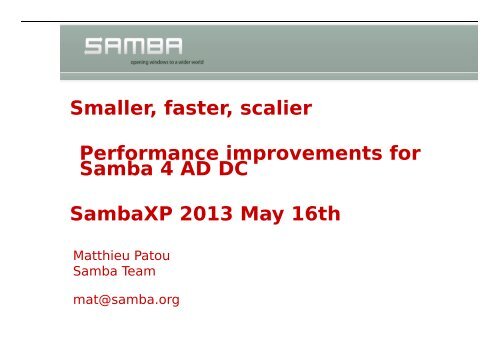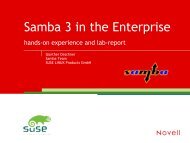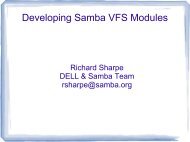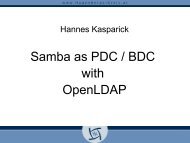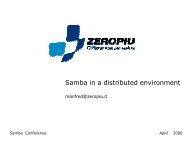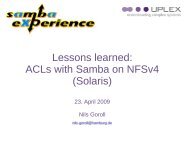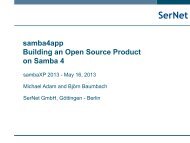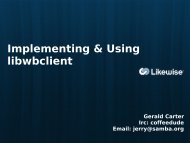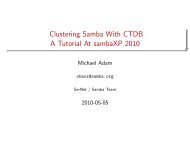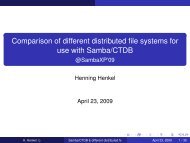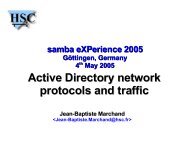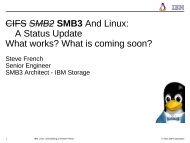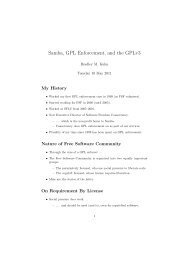Create successful ePaper yourself
Turn your PDF publications into a flip-book with our unique Google optimized e-Paper software.
Smaller, faster, scalierPerformance improvements forSamba 4 AD DCSambaXP 2013 May 16th<strong>Matthieu</strong> <strong>Patou</strong>Samba Teammat@samba.org
Agenda» Disclaimer» How did it started» Speeding up schema modification (1/2)» A word on callgrind» Speeding up schema modification (2/2)» Making faster and scalier: things you thought for granted» Making faster and scalier: some details on how our currentdatabase» Making it faster and scalier: Things in progress» Making it faster and scalier: Current results» What about the smaller, from the title ?
» What about OpenLDAP ?» My queries are slow, what can I do ?
DisclaimerThe views and opinions in this presentation are my ownand do not necessarily reflect the views and opinions of mypresent,past and future employers.
How did it started ?» Last year around last Samba XP, We were trying to confirmthat Samba handling of the schema was quite ok» So we said, let's check that you can install Microsoft Exchangeserver on top of Samba» Because Exchange modifies a lot the schema of AD» So if it manages to install the schema without trashing theprovision we could declare that our handling of schema is"quite ok"*» After some tweaking we somehow managed to pass theschema change in ~2 hours» It takes ~ 5 to 10 minutes with a Windows DC, in a VirtualBoxVM ...
» There was room for improvement* Ask Metze for more details on what we don't check that could breakyour schema and that's why schema modification are not enabled bydefault
Speeding up schemamodification (1/2)» Need to trace where the time is spent» gprof was not giving any insight» callgrind was (too much?) great» Debug where the time was spent with schema modificationsin exchange was not super simple because modifications werenumerous and tracing would take ages» Hopefully adding 5 classes and 10 attributes was also muchslower than it should be» Tracing showed that we were spending most of the timereloading the current schema from the database
A word on callgrind» Part of the valgrind familly» Has a pretty neat frontend:kcachegrind» Has the --instr-atstart=option, that can be used totrace only when you need andskip the initialisation for instance (and speed-up the tracingby side effect» Has to be used with callgrind_control to control when youwant to start and stop tracing (sleep can help to leave enoughtime to issue the commands)» A brain is still needed because sometime presentation of thenumber can be missleading
» It slows down quite a lot applications so be prepared
Speeding up schemamodification (2/2)Why it was slow:» In order to comply with all Microsoft implementation, schemais queried several times per LDAP or RPC request, so in orderto speedup this Samba 4 (as Windows I suspect) ismaintaining some structure so that every query didn't end upreading the database.» Creation of those structures is not cheap, and has to beredone every time the schema is changed (via RPC) or if weare asked to reload it (schemaUpdateNow via LDAP) but inreal life you are not modifing the schema every day (do you ?)» In order to make our developer life easier, Samba 4 used toreload the schema every time it was changed when Windows
would do it only after 120 seconds or if theschemaUpdateNow "command" was issuedWhat has been done:» Brilliant idea #1: let's not reload the schema every time itchanged but only after xx seconds or after theschemaUpdateNow "command"» Brilliant idea #2: not everybody is modifying the schema atthe same time so let's cache some information (ie. nextmsDS-IntId) and check the USN to see if we can rely on ourcache or if we have to do a real search=> we are able to do the full install of exchange in < 30 minutes, abit faster than Windows on my VMs
Making faster and scalier:things you thought for grantedContext:» 70K objects (users, groups, DNS entries, contacts, what not,...)» Search on baseDN"DC=test.corp,CN=MicrosoftDNS,CN=System,DC=test,DC=corp"with criteria (dc=server1)» Will do a full scan on your root partition will load every singlerecord in this partition, check if it match the criteria and thenfilter on the dn to check it match the DN of the search» not good !» Search on baseDN"OU=SmallOU,OU=MyCompany,DC=test,DC=corp" with
criteria (objectclass=user)» Will do an indexed search (great) and load all objects thatmatch the criteria (a lot) and then will filter those that matchthe DN of the search» not good !
So:Making faster and scalier:some details on how ourcurrent database» Samba 4 use ldb for storing the data, it's a tdb databasebehind the scene» Key is the casefolded version of the DN» Value is complete LDAP record, you have to unpack the wholerecord to easily access a field» Index are also key/value, where the value is actually the DN ofthe record that match the entry» For every indexed search, we search the index(es), get theDN, fetch the objects that match the index, finish the filtering
for non indexed attributes» Each DN of the index has to be casefolded in order to be ableto search for the associated record» For each record we will casefold the DN in order to see ifmatch the DN and the scope of the search» Unpacking the object means a lot of talloc calls (between 50and 100 per object)
Making it faster and scalier:Things in progressCode is not yet in master but at my git tree in the branch ldb_perfs» Casefolding can represent 50% of the time spent in the search» Let's store the DN in the index already case folded, better paythe price for case folding only once (when stored) than milliontime (when read)» Let's use the DN of the index for cheching if the record matchthe DN and the scope of the search, so that we don't recasefold» Freeing talloced object can at the end be expensive, allocatingand freeing object that you don't need is a important waste ofresource and can account for 20/30% of the time of thesearch» Check if the object match the DN and the scope of the searchbefore loading the object, by using either DN from the index
entry or the key (which is a DN) passed the search_func. So thatwe don't load objects that we don't need» Provide a list of attribute we need to the unpack function so thatwe skip the attributes we don't need» Remove double loops in the operational module, so that wespeedup the processing of each object returned by the search
Making it faster and scalier:current resultsMore detail in the thread ldb + samdb perfs and ideas for perfimprovement» Search on baseDN"OU=SmallOU,OU=MyCompany,DC=test,DC=corp" withcriteria (objectclass=user), 600/700% improvement» Search on baseDN "DC=test,DC=corp" with criteria(objectclass=user) and just the samaccountname asrequested attribute, 500%/700% improvement» Search on baseDN"DC=test.corp,CN=MicrosoftDNS,CN=System,DC=test,DC=corp"with criteria (dc=server1) and attribute dnsZone, 100/130%improvement
» 20% speed improvments in make test for AD DC related tests
What about the smaller, fromthe title ?Future development» Range indexing, ie being able to index things like(uSNChanged
» Should speed up the verification of NT ACLs, as once theverification has been done for a given SD then we can keep theresult of identical SD
What about OpenLDAP ?Disclaimer: I have a bias» OpenLDAP has a good reputation of being able to deliver highperformance LDAP» Speed gains from switching tdb to openldap as the backendneed still to be proved
My queries are slow, what can Ido ?» UseLDB_WARN_UNINDEXED=y ldbsearch -H PATH_TO_LDB criteria» If suspicious request come through LDAP and you are not ableto identify them, restart samba with LDB_WARN_UNINDEXEDexported» Use callgrind (perf ?) when you have a precise scenario, beready to share the trace with the team (but I don't know ifsome data are leaked in traces)» Help us to get script to get automatically a realisitic databaserepresenting your usecase so that we can reproduce it
QuestionsQuestions ?
Thank youThanks for listenningA copy of the slides will be atwww.matws.net/mat/pres/xp2013


